“Well, hell. I thought I looked like George Clooney in real life.”
“He could be a distant relative,” Weaver agreed, as they shook hands. “Very distant. Fourth or fifth cousin. C’mon in.”
Weaver sat on his bed and Lucas took the desk chair and they spent twenty minutes getting acquainted, talking about the task force and the problems it faced. Weaver didn’t try to disguise the fact that they hadn’t accomplished much.
“We didn’t have a place to start. We know where the boat was kept, which was on the New River, next to a house. Down here, as you get closer to the coast, it’s like Venice, the New River and all these canals running up through the neighborhoods. The space was rented from an absentee homeowner based on an advertisement he’d put up on the net and he’d never actually met the boat owner.”
“Pretty convenient for the boat owner, given what they were doing with the boat,” Lucas said.
“Good piece of research by the assholes, is what I think,” Weaver said. “The homeowner, the guy with rights to the dock space, is one of those super-rich investment honchos. He has about six houses, up in Manhattan and the Hamptons and a ranch in Wyoming and another place down in the Islands. He’s here about three or four weeks a year. He has a management service to take care of cleaning and maintenance, and it was actually the service that put up notice for the dock space rental. Those people didn’t see the boat owner, either. They said the whole deal was handled by mail, they got a money order to pay six months’ rent, and one day the boat was parked there. They clean the house twice a month and they only saw the boat twice, so it probably wasn’t parked there for more than a month and a half. The last time they saw it was a week before it burned and sank.”
“And the homeowner looks straight?”
“We now know the color of his undershorts. I mean, however much junk got dumped in the ocean, he could buy all of it, and a hundred times more with the money he earned last year. I got the feeling he’s a crook, but not a dope crook, a financial services crook.”
“All right. Well, my partner and I—I think you’ve heard from him . . .”
“I have . . .”
“We’ve read all your research paper and we’ll be reading it again, and then we’ll go kick over some garbage cans. You’ve been around for a while, what do you think about that whole idea?”
Weaver shrugged: “Nothing else has worked. Might as well try some marshal stuff. I know about your record, so . . . glad to have you.”
That, Lucas thought, was the first time an FBI agent had actually said that to him.
Bob was waiting in the lobby. “Good talk?”
“Yeah, we’ll get along. Weaver will take anyone who can help. Any scrap he can get.”
They left the hotel and walked down a narrow dark lane to a place called the Rendezvous, got a table outside overlooking a marina crowded with half-million-dollar boats—those were the ordinary ones, the big ones were parked around the edges—ordered sea bass for Bob and chicken tenders for Lucas.
Bob was a large man, with a square face, small battered ears, short hair, and an easy smile. He was neither fat nor tall. He’d killed a cannibal earlier that year, more by accident than by intention, but nobody grieved for the dead man. Bob had finished third in the NCAA’s heavyweight wrestling division in his senior year at Oklahoma and could do a hundred good pushups in three minutes with his girlfriend, who weighed a hundred and thirty pounds, sitting on his shoulders. He was wearing a double-extra-large golf shirt, khaki shorts, and cross-trainers. He could have sold billboard space on his back.
He said to Lucas, over margaritas, “I’ve seen a couple of FBI spooks. I went up the elevator with two of them. They had those plastic cards around their necks, you know the kind? It’s not like they’re hiding. I said hello and one of them was tempted to nod at me, but he didn’t.”
“Sounds about right,” Lucas said. A good-looking waitress came over to make sure the drinks were okay, complimented Bob on his shoulders, and leaned in as she refreshed their glasses of water. When she left, Lucas looked back to Bob and asked, “How’s Rae doing?”
“She was in town yesterday to get more clothes. Her mom’s starting chemo right away. Gonna lose her hair. Rae wants her to shave her head before it starts coming out.”
“Ah, boy . . . Is Rae still pissed at me?” Lucas had shot to death a man on a case the three had worked together.
“She was never pissed. She just would have given that guy a chance,” Bob said. “She thinks you went there intending to kill him and that’s what you did. Her brain doesn’t work like that. Neither does mine, come to think of it.”
“Even though you saw the dead kid in the schoolyard?”
“Even though. I’m a lawman,” Bob said. “You’re looking for justice. Those are two different things. We know that, me’n Rae, and we’re willing to live with it.”
“Yeah, well . . .”
“I’ll still kiss you on the lips if you want,” Bob said.
“Not necessary.”
They spent the meal talking about this and that, a one-man band in the corner playing vintage soft rock over the conversation, the rumble from I-95 providing the thumping bass notes. When they were ambling back to the hotel through the dark, Lucas said, “This is boat show week. It’s over by the ocean. We need to start there tomorrow morning.”
“What’s there?”
“The Coast Guardsman who killed that dope runner. He’s out of the Coast Guard now, he’s going to college down here, and he’s working the boat show for extra cash. We need to talk to him. Before that, there’s an eight o’clock status meeting with the task force in one of the hotel meeting rooms. That should be done by nine.”
“I’m looking forward to it,” Bob said, and he yawned.
“Wear shorts,” Lucas said. “Gonna be hot.”
“All right.”
“And maybe you should bring your gear bag with you. Leave it partly unzipped with your M4 on top.”
Bob brightened. “That wouldn’t have occurred to me, but I can already see it in my mind’s eye.”
The hotel had a breakfast spread in the morning, twelve dollars. Bob ate some of everything in sight, Lucas focused on pancakes, with a bottle of Diet Coke from the gift shop. Four men who looked like FBI agents were there, clustered in a quiet group bent over their food, all in suits but none wearing neckties; there must have been a special tropical dispensation, Lucas thought.
They glanced at Bob and Lucas from time to time, but made no move to talk to them. The daytime temps were supposed to reach 84 and Lucas and Bob were going to a boat show, so they were wearing guayabera shirts loose over their guns, khaki cargo shorts, and athletic shoes. Bob added a blue baseball cap that said nimbus on the front.
“What’s a Nimbus?” Lucas had asked.
“A rain cloud. Or, could be a halo, but in this case, I think a rain cloud, since we’re gonna rain on the FBI’s parade,” Bob said.
“Good-looking hat.”
“Thank you. I got it for free from some guy who had a box full of them in the lobby,” Bob said. “I think it’s the name of a boat he’s trying to sell. Guy looked like a country singer, but I can’t remember which one.”
On the way to the elevators, Lucas, trailing Bob, realized that their shirts and shoes almost matched, and their shorts did match. In the elevator, he asked, “The way we’re dressed . . . you think we look like aging gay guys?”
“I’m not aging,” Bob said.
The meeting room was a long rectangle meant to look like a corporate boardroom, pale plastic wall coverings and a table that resembled wood. The room had a row of windows, but the shades had been drawn; a box of donuts and a tank of coffee sat on a side table with packs of sugar and creamer. Weaver was hovering over a stack of files and computer printouts on the boardroom table when Lucas and Bob arrived, five minutes early, and he nodded at them.
Читать дальше
![Джон Сэндфорд Ocean Prey [calibre] обложка книги](/books/384313/dzhon-sendford-ocean-prey-calibre-cover.webp)
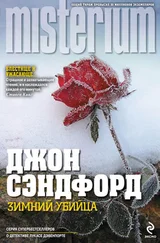


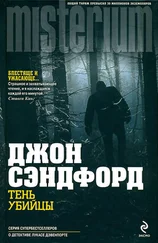
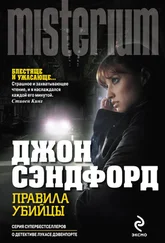
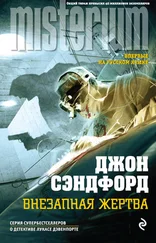
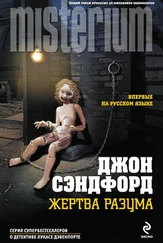



![Джон Ирвинг - Viename asmenyje [calibre]](/books/384315/dzhon-irving-viename-asmenyje-calibre-thumb.webp)
![Джон Ирвинг - Vandens metodas [calibre]](/books/384316/dzhon-irving-vandens-metodas-calibre-thumb.webp)